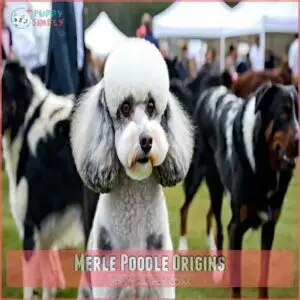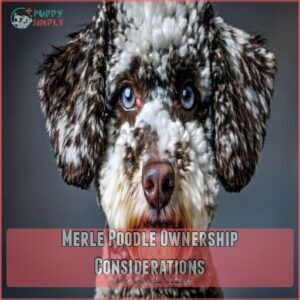This site is supported by our readers. We may earn a commission, at no cost to you, if you purchase through links.

This unique look comes from a genetic mutation, often introduced by crossbreeding with herding dogs like Australian Shepherds.
While the coat is beautiful, it can come with serious health concerns, like blindness or deafness, especially in "double merle" puppies.
Ethical breeding is critical, as some breeders mislabel pedigrees or ignore the risks.
If you’re considering a merle Poodle, do your homework—choose a reputable breeder who prioritizes the dog’s health over trends.
Understanding these nuances is key to responsible ownership.
Table Of Contents
- Key Takeaways
- Merle Poodle Origins
- Merle Poodle Health Risks
- Merle Poodle Breeding Practices
- Merle Poodle Controversies
- Merle Poodle Ownership Considerations
- Frequently Asked Questions (FAQs)
- What is merle in Poodles?
- Do merle Poodles have health problems?
- Are merle Poodles expensive?
- What is the rarest color in Poodles?
- Are merle poodles a recognized breed by the AKC?
- Are there any other breeds that carry the merle gene?
- How can I tell if a poodle is a purebred?
- What is the cost of owning a merle poodle?
- Is breeding two merle parents together discouraged?
- Are Merle Poodles hypoallergenic like other Poodles?
- Conclusion
Key Takeaways
- You’ll find that merle Poodles aren’t naturally occurring in the breed—this distinctive coat pattern comes from crossbreeding with herding dogs, raising questions about pedigree accuracy and genetic integrity.
- Your merle Poodle faces higher health risks, particularly deafness and blindness, with these dangers significantly amplified in "double merles" (puppies born from two merle parents).
- You should be wary of unethical breeding practices, as some breeders falsify pedigrees or prioritize profit over health, leading to compromised genetic integrity and potential health issues.
- When considering a merle Poodle, you’ll need to verify the breeder’s reputation, ensure they conduct proper genetic testing, and understand that while these dogs generally share the friendly, intelligent temperament of standard Poodles, their unique appearance comes with ethical considerations.
Merle Poodle Origins
You might be surprised to learn that Merle Poodles didn’t naturally develop within the breed.
Their origins likely trace back to crossbreeding with herding dogs, raising questions about pedigree accuracy and genetic integrity.
Genetic Mutation and Outcrossing
The Merle origins in poodles likely trace back to outcrossing with herding breeds, introducing the merle gene not naturally found in purebred poodle genetics.
This genetic marker, responsible for the unique coat patterns, follows a dominant inheritance. While some argue it’s a natural mutation, genetic testing is vital to verify poodle purity and prevent potential genetic disorders tied to the merle gene.
Pedigree Falsification
Some breeders use falsified registrations to market Merle Poodles as purebred, despite their origins.
Misleading pedigrees and breeder deception make it hard to trust claims of genetic purity. While AKC papers might seem reliable, they don’t guarantee pedigree accuracy.
Always prioritize pedigree verification to guarantee canine pedigree integrity and avoid supporting unethical practices that compromise breed standards and health.
Merle Poodle Health Risks
Merle Poodles face serious health risks, including a higher chance of deafness and blindness, especially in double Merles.
Double Merle Poodles risk severe health challenges, from deafness to blindness, underscoring the need for responsible breeding and genetic testing.
Hidden or cryptic Merle genes can make breeding even riskier without proper genetic testing, which involves understanding the potential for hidden genetic issues.
Deafness and Blindness
Hearing and vision problems are serious concerns with the Merle gene. Pigment loss linked to this gene often causes deafness or blindness in affected dogs.
Watch out for these risks, especially in double merles. Here’s what to know:
- Deafness is common.
- Blindness can occur.
- Eye development issues arise.
- Genetic testing is key.
- Double merle syndrome worsens outcomes.
The importance of understanding these risks cannot be overstated, as double merle syndrome can have severe consequences for the health and well-being of affected dogs.
Double Merle Health Issues
Double merles face serious health risks, including deafness, blindness, and organ defects.
These result from improper pigment development, which also contributes to skeletal problems.
Double merle syndrome, caused by inheriting two merle genes, often leads to severe deformities.
Genetic testing is essential to avoid breeding double merles and prevent these tragic outcomes, and to prioritize ethical practices to protect future generations.
Regular veterinary check-ups are also essential.
Hidden Merle and Cryptic Merles
Identifying cryptic merles in merle poodles can be tricky since they often look like solid-colored dogs.
Hidden merle patterns, influenced by poodle genetics and dog coat colors, require DNA testing for confirmation.
Without testing, breeding implications arise, risking double merle puppies with severe health concerns.
A merle poodle test can help breeders avoid these issues.
Ethical dilemmas highlight the importance of responsible practices to safeguard both the breed’s health and integrity.
Merle Poodle Breeding Practices
Breeding Merle Poodles often involves crossbreeding with herding breeds, raising concerns about pedigree accuracy and health risks.
Some breeders prioritize profit and trends over ethical practices, leading to falsified pedigrees and compromised genetic integrity.
Crossbreeding With Herding Breeds
Merle Poodles owe their unique dog coat colors to herding breed genes introduced through crossbreeding.
This practice, while trendy, raises ethical breeding concerns and risks. Here’s why:
- Merle Gene Introduction contradicts poodle breed standards.
- Crossbreed Health Risks include blindness and deafness.
- Herding Breeds pass on drug sensitivities.
- Poodle Genetics face long-term alteration risks.
The merle pattern results from a retrotransposon insertion in the PMEL gene.
Unethical Breeding and Falsified Pedigrees
Falsified pedigrees and breeder deception fuel the merle poodle controversy, raising concerns about pedigree integrity and dog breeding ethics.
Unethical breeding often involves misrepresenting genetic verification, leading to health risks and distrust.
Puppy mills exploit trends, ignoring proper practices, which can lead to severe health issues.
Consumers must prioritize protection by researching breeders thoroughly to avoid falling victim to these dog breeding controversies and guarantee responsible, ethical practices, focusing on responsible breeding and ethical practices to avoid issues associated with irresponsible breeding, such as those linked to severe health issues.
Profit-Driven Breeding and Trend Prioritization
Breeding Merle Poodles often prioritizes market demand over genetic integrity. This trend fuels unethical practices like falsified pedigrees and puppy farms.
Prioritizing trends over genetic integrity fuels unethical breeding practices, risking dog health and compromising the Merle Poodle’s true lineage.
Unscrupulous breeders exploit consumers through:
- Puppy mills prioritizing quantity over health.
- Ignoring dog breeding ethics for profit.
- Selling health-compromised dogs as purebred.
- Promoting trends without considering consequences.
- Overlooking breeder ethics and long-term breed welfare.
Choose ethical breeders to avoid consumer exploitation and ensure the well-being of the dogs, considering the importance of breed welfare.
Merle Poodle Controversies
Regarding Merle Poodles, controversies often center around health risks, questionable breeding practices, and pedigree integrity.
You’ll also find debates over kennel club bans and the ethics of prioritizing trends over the breed’s long-term well-being.
Kennel Club Regulations and Bans
The Kennel Club bans Merle Poodles, citing genetic contamination and ethical implications.
Though AKC regulations allow limited registration, their policies prohibit Merle dogs in shows, emphasizing breed integrity.
Penalties for misleading Kennel Club registration reinforce consumer protection.
Here’s an overview:
| Issue | Kennel Club | AKC | Impact |
|---|---|---|---|
| Registration Consequences | Total ban | Limited registration | Prevents pedigree falsification |
| Breed Integrity | Top priority | Moderate focus | Preserves natural genetics |
| Genetic Contamination | Strict controls | No specific measures | Safeguards original traits |
| Ethical Implications | Enforced | Partially addressed | Discourages irresponsible breeding |
Consumer Awareness and Education
When buying a merle poodle, verify the breeder’s ethics and credentials.
Make certain they prioritize genetic testing to protect dog health and prevent hidden risks like double merle occurrences.
Ethical purchases mean checking pedigree integrity and securing health guarantees.
Choose breeders who uphold ethical dog breeding practices, not trends.
Remember, responsible breeding protects both your pup and the broader canine community.
Preserving Breed Integrity and Health
Protecting genetic diversity in merle poodles means sticking to ethical breeding practices and prioritizing canine health over trends.
Health testing and following breed standards help guarantee responsible ownership and stronger dog genetics.
Breeding isn’t just science—it’s stewardship. When you support breeders who value genetic testing and ethical dog breeding, you’re safeguarding the integrity and future health of these unique companions, ensuring responsible ownership and stronger dog genetics.
Avoiding Unethical Breeders and Practices
When considering a Merle Poodle, avoid puppy mills and prioritize reputable breeders who value ethical breeding.
Look for health clearances, genetic testing, and breeding transparency. Verify pedigrees thoroughly to guarantee honesty and avoid hidden risks.
Reputable breeders emphasize responsible breeding over trends, guaranteeing healthy puppies and preserving breed integrity. These breeders understand that merle genetics can introduce health risks.
Skip breeders who jeopardize ethics for quick profits—your future pet deserves better.
Merle Poodle Ownership Considerations
When considering a Merle Poodle, you’ll need to weigh its unique coat patterns and temperament against potential ethical and health concerns.
Make sure to research the breeder’s reputation, ensuring they follow responsible practices and perform proper genetic testing.
Unique Coat Patterns and Appearance
Merle poodles sport enchanting coat patterns, blending patches of solid colors with marbled hues.
Merle color variations, from blue to chocolate, make them visually unique.
Eye color genetics often lead to striking blue or partial blue eyes.
However, grooming challenges arise due to uneven coat texture effects.
Understanding coat color genetics guarantees proper care for these distinctive dog coat patterns.
Responsible breeding practices are key to avoiding severe health issues in merle-coated dogs.
Temperament and Personality Traits
Merle Poodles match the friendly, intelligent poodle temperament most love.
Their socialization needs are high—they crave family time and bond deeply. While typical poodle characteristics guarantee they’re smart and trainable, training challenges arise without consistent effort.
Expect moderate activity levels; they thrive on play and mental stimulation, making them great companions for families who appreciate these canine temperament traits.
- Outgoing Personality: Enjoy their playful, affectionate nature.
- Highly Intelligent: Quick learners but need engagement.
- Active Lifestyle: Love regular physical and mental activities.
- Family-Oriented: Form strong, loving connections with close-knit households.
To help with training, consider using poodle training treats.
Verifying Breeder Reputation and Ethics
A good breeder’s honesty speaks volumes.
Ask for health clearances, detailed pedigrees, and proof of genetic testing.
Ethical standards mean prioritizing the dogs, not trends.
Transparency guarantees no sketchy practices or falsified pedigrees.
Trustworthy poodle breeders focus on lineage improvement and proper dog breeding practices.
Pedigree verification adds peace of mind, showing they respect canine genetics ethics above all else.
To find a breeder, research ethical breeding practices to guarantee responsible sourcing.
Frequently Asked Questions (FAQs)
What is merle in Poodles?
Merle in Poodles refers to a unique coat pattern marked by mottled or marbled colors, often with eye color variations.
It’s a controversial trait introduced through crossbreeding, carrying potential health risks if bred irresponsibly.
Do merle Poodles have health problems?
These dogs face higher risks of hearing or vision issues, especially if they inherit double Merle genes.
Genetic defects, like cardiac or skeletal problems, are possible, so responsible breeding practices and testing are essential for their health.
Are merle Poodles expensive?
You might be surprised, but Merle Poodles can be quite pricey, often fetching higher prices due to their rare coat patterns.
Expect costs from $2,000 to $5,000, with some breeders charging even more!
What is the rarest color in Poodles?
The rarest Poodle color is often considered to be apricot.
It’s a soft, pale orange shade that’s tricky to produce genetically, making it a real gem if you ever spot one!
Are merle poodles a recognized breed by the AKC?
You’d think such a striking coat pattern would earn a spotlight, but nope!
Merle Poodles aren’t officially recognized by the AKC.
While they’re registerable, their unique look clashes with traditional breed standards, which is a striking issue.
Are there any other breeds that carry the merle gene?
Breeds like Australian Shepherds, Border Collies, Shetland Sheepdogs, and Great Danes naturally carry the merle gene.
It’s a unique genetic trait creating that striking mottled coat pattern, but it also comes with health considerations.
How can I tell if a poodle is a purebred?
Spotting a purebred Poodle is like finding the perfect puzzle piece—it should match AKC breed standards, feature predictable traits, and have registered pedigree papers.
DNA testing guarantees no surprise genetics sneak into the mix, ensuring a purebred Poodle with registered pedigree papers.
What is the cost of owning a merle poodle?
Owning a Merle Poodle can cost $1,500 to $5,000 upfront, depending on the breeder, location, and pedigree.
Factor in ongoing expenses like grooming, vet care, food, and training, which can add up quickly.
Is breeding two merle parents together discouraged?
Breeding two Merle parents is like playing genetic roulette—it doubles the odds of severe issues like blindness and deafness in offspring.
Always prioritize responsible breeding by avoiding double Merle pairings and conducting proper health testing.
Are Merle Poodles hypoallergenic like other Poodles?
Yes, Merle Poodles are considered hypoallergenic, like other Poodles, thanks to their low-shedding coats.
However, individual allergy sensitivities vary, so spending time with the dog first can help confirm compatibility with your allergies.
Conclusion
In regard to merle Poodles, don’t judge a book by its cover—there’s more beneath the surface than a striking coat.
Understanding the genetic quirks and health risks tied to the merle pattern is essential.
Always choose an ethical breeder who values health over trends and provides full transparency about their breeding practices.
Owning a merle Poodle means embracing both its beauty and responsibility. Do your due diligence, and you’ll guarantee your pet’s well-being and happiness.
- https://www.wisconsindesignerdoodles.com/stokeshire-doodle-puppy-blog/merle-coat-coloration-in-poodles-and-doodles-a-historical-and-genetic-overview?srsltid=AfmBOop5JILXyejW60JU2eF4PJ7iaoo7zW11PRHkGy9y2AOj5V1tMt4T
- https://www.poodleforum.com/threads/merle-poodle-genetics.285946/
- https://aluestandardpoodles.com/merle-poodles-are-not-purebred-poodles















